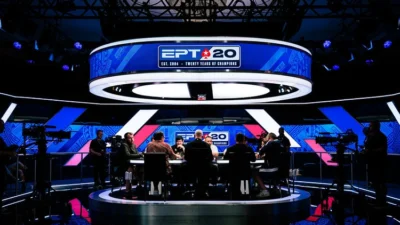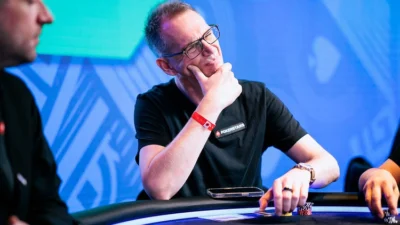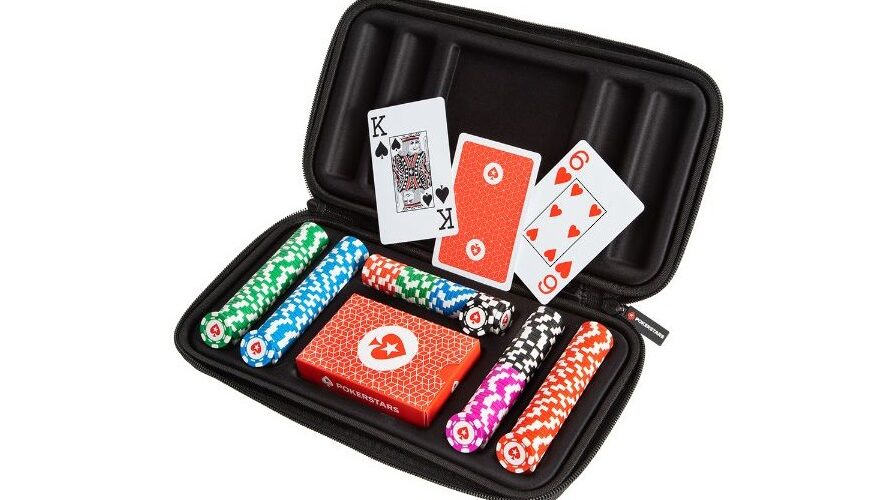I know a lot of players who start out playing online at PokerStars eventually make the move to start playing live poker, and so I thought I’d share three tips that might be helpful to those who are new to playing live. There’s a lot that is different and which requires adjustment, but keeping these three tips in mind can be a great way to get started.
Want to get started at PokerStars? Get an account here.
It’s easy enough to do some Google searches and learn about basic poker strategy — you know, things such as the value of playing tight, of playing from position, of playing against weaker opponents, and so on. But these tips I’d like to share aren’t really focused on poker strategy, but rather have to do with how you act and respond to other players’ actions at the table.
I’m assuming with these tips you have some experience, then, although they should help beginners, too, hopefully instilling some good habits right from the start with their live play.
Tip #1: Protect Your Cards At All Times
First off, never let anyone — including the dealer — take your cards away from you prematurely when you are in a pot. This is especially important when the action has concluded and you think you are the winner.
I’d recommend following the procedure I always employ. Whenever I win a hand, I keep my cards until the dealer slides the chips to me, and only then do I give up my hand. That way I am sure I am the winner of the pot, and I never make the mistake I’ve seen others make by mucking a winning hand.
I’ve seen that happen so many times in my career. Once I was in a tournament in Portugal playing with an experienced player who I noticed was tossing his cards away very quickly when hands ended, so quickly that sometimes I wasn’t even sure he had won the hand. It got to the point that I decided to tell him to be more careful with his cards and wait for the chips to be slid to him before he let his cards go.
He thanked me for the tip, but he kept doing it. Sure enough a hand came up in which a big three-way pot developed and he mucked his cards without realizing another player was still in the hand. The other guy was going to fold in fact, but he won the pot because the fellow had mucked too soon.
Sometimes during a hand I’ll put chips on top of my cards to protect them, especially when I am in Seat 1 or Seat 10 and positioned right next to the dealer. In any case, always be mindful to protect your cards from the beginning to the end of every hand, particularly when the hand has ended and you think you are a winner.
Tip #2: Stay Focused on What Is Happening at the Table
This might sound like an obvious piece of advice, but so many players fail to follow it. When playing live, resist the urge to take out your phone and check Facebook, Twitter, WhatsApp, and so on. When you fold a hand, don’t start texting friends or doing other things to distract you from what’s going on around you. In many ways, I think your phone can be your worst enemy at the poker table, keeping you from being fully engaged and thus making it harder for you to play well.
There is so much information to be gathered every single hand, even when you aren’t involved. I especially recommend focusing on how players act during hands in which bigger pots develop. Say a player in a heads-up pot goes all in on the turn, and his opponent starts to tank as he decides what to do. This is an excellent time to start playing close attention to how both players are acting.
In fact, you will notice in these situations that everyone usually focuses on what the player making the decision is doing (those who aren’t checking their phones, that is). But actually I think that’s a mistake — you should be looking at the other guy, the one who pushed all in. Most of the time what has happened is he has either made a big bluff or is making a big value bet. In either case, you should pay attention to how he looks and behaves, then if there is a showdown you can associate his behavior with the result and use that information later if you end up in a big hand against the same player.
It’s such a simple thing to remember. It is important to follow the action and watch what players are doing as they act, but think also about looking at the players who have already acted and who are waiting for an opponent to do something. In many cases, these are the best times to pick up information (including tells).
After folding and watching my opponents play out a hand, I also like to challenge myself to figure out what the players might have. As the action proceeds, I work on narrowing down each player’s range of possible hands and try if I can to guess what each has, then at showdown I can see if I was correct. And if I was correct, I can then think about how the players behaved and see if they act the same way with similar hands in the future. Inexperienced players especially tend to give away a lot of information when they act, so it’s very much worthwhile to pay attention to them when they get involved in hands.
You won’t always gain information this way, but sometimes you will. Players really do exhibit the “weak means strong” or “strong means weak” tells sometimes. They also will demonstrate other patterns of behavior that can help you going forward. But obviously you can’t gain any of this information if you’re checking your phone or iPad while a hand is playing out.
#3: Avoid Talking While In a Hand
This is a tip that I myself only recently started to follow, namely, to keep quiet while involved in a hand. There are really very few players for whom talking during a hand helps them more than hurts them, in my opinion. I now only talk in very special situations, and even resist answering when players ask “Are you bluffing?” or other questions of me in a hand.
Now I’m plenty social when I’m not involved in a hand, and enjoy having conversations and getting to know people while playing. But in truth it is almost always detrimental to be talking while you’re in a hand.
Imagine if you were somehow obligated to talk every single time you were in a hand — that is, to say something about every action you make and that your opponent makes, too. In the end, I’m pretty sure you will be giving away some information both about what you’re doing and what you think about what you’re opponent is doing.
I’d say resist talking altogether when in a hand, but especially when you are bluffing, as it is a relatively uncommon play and the chances that you’ll be relaxed enough to chat without giving away anything are lower. It’s a little bit easier to talk and perhaps even disguise your hand strength when you have a good hand, but even then I’d advise against talking, especially if you are relatively new to live poker.
I have more advice for those starting to play live poker, but if you follow these three tips they should give you a good start when making the move from online to live play.
Henrique Pinho is a member of Team PokerStars Pro
Back to Top










